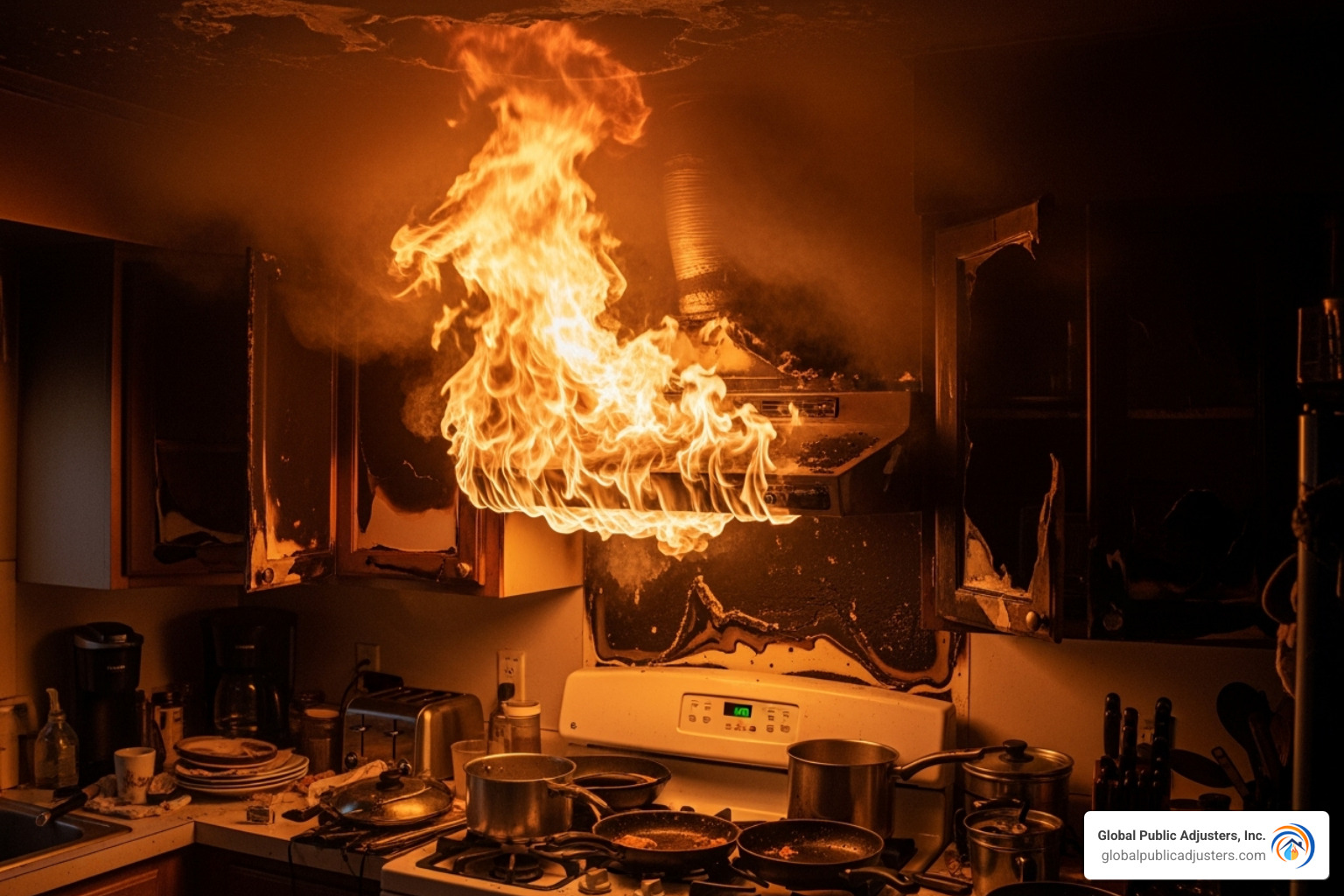Kitchen exhaust fan fire: 3 Critical Tips
Why Kitchen Exhaust Fan Fires Are More Common Than You Think
Akitchen exhaust fan firecan turn your cooking space into a dangerous inferno in minutes. These fires often start when grease buildup in your exhaust system ignites, spreading flames through ductwork and potentially destroying your entire kitchen.
Quick Prevention Guide:
- Clean filters monthly– Remove grease buildup that acts as fuel
- Inspect ductwork annually– Look for grease accumulation and blockages
- Listen for warning signs– Strange noises, grinding sounds, or burning smells
- Maintain proper clearances– Keep 18 inches between heat sources and grease removal devices
- Use correct installation– Metal ducts only, minimize bends, proper exterior termination
Kitchen fires are a persistent threat, with exhaust system failures being a major contributor. According to fire department data, U.S. fire departments respond to an estimated7,640 structure fires per yearin eating and drinking establishments, with approximately 60% involving cooking equipment. These fires cause an average of $246 million in direct property damage annually.
The danger is hidden.Cooking grease vaporizes and condenses inside your exhaust system, creating a flammable coating. A simple stove flare-up can ignite this layer, turning your exhaust system into a conduit for fire.
Many homeowners overlook this risk. Unlike obvious hazards, these fires stem from neglected maintenance, like a dirty filter or grease-clogged ductwork.
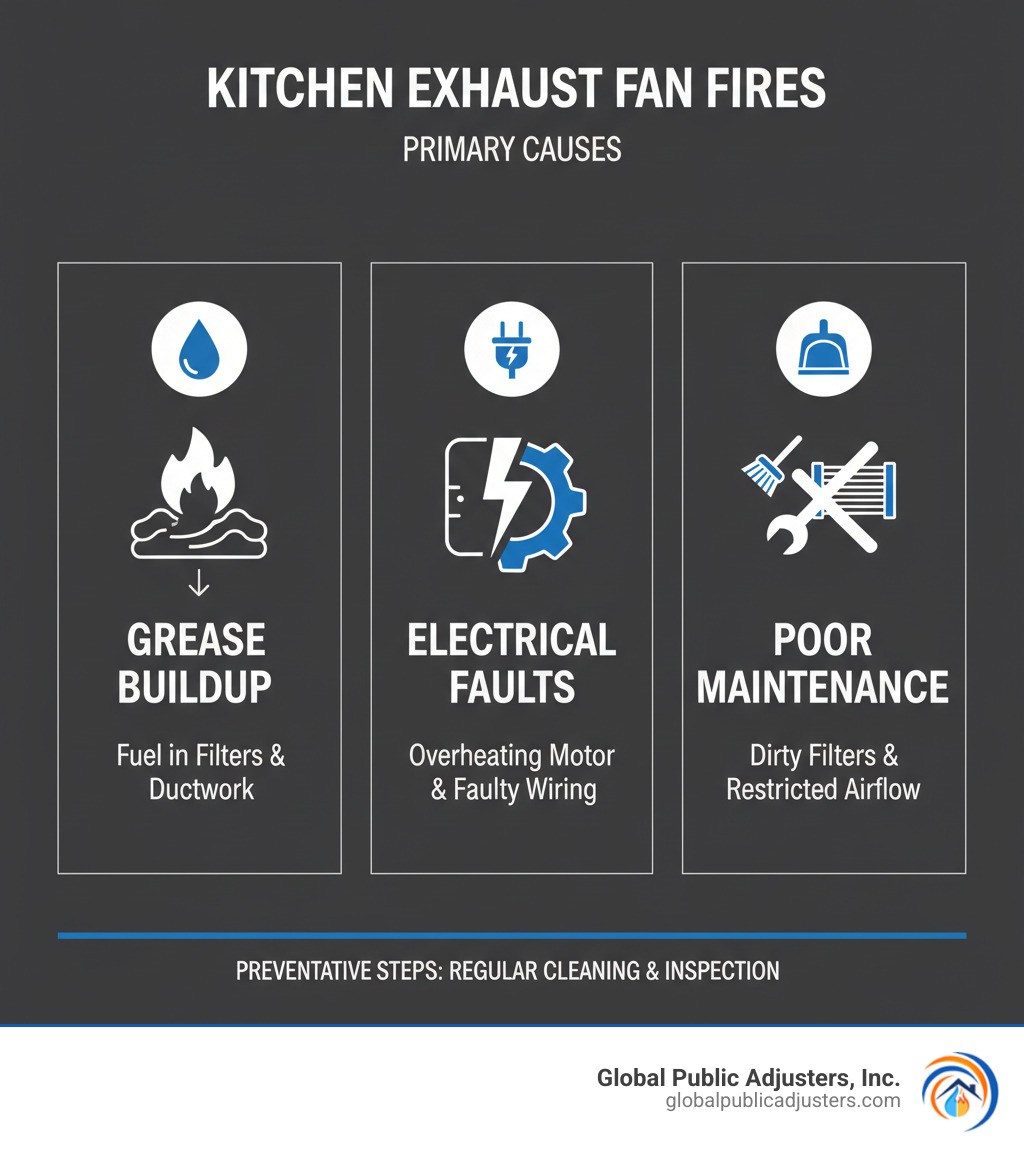
The Anatomy of a Kitchen Exhaust Fan Fire
Your kitchen exhaust system is designed to remove grease and heat, but it can become adangerous pathway for fireto spread. Akitchen exhaust fan fireusually has three causes: grease buildup, electrical faults, and poor installation. The issue is rarely the fan alone but the entire system.
Grease is the primary fuel.During cooking, grease particles stick to fan blades, filters, and ductwork, creating a highly flammable coating over time.
Electrical faults are a silent threat.Overworked motors from clogged filters can overheat. Worn bearings can cause a motor to seize, drawing excess electricity and heating up to over 400°F—hot enough to ignite grease.
Poor installation exacerbates the risk.Plastic ducts, sharp turns, or improper sizing forces the fan to work harder, increasing heat and grease accumulation.
Once a fire starts, it moves fast. A stove flare-up can ignite greasy filters and race through the ductwork. The fan feeds the fire with oxygen, pushing flames forward. As seen in examples ofWhat Happens When a Fire Erupts in a Kitchen Exhaust System, this can quickly turn a small cooking fire into major property damage, making kitchens one of the most common places where fires occur in homes.
How Grease Buildup Creates a Firestorm
Every time you cook, tiny grease droplets are pulled into your exhaust system. As the air cools in the ductwork, these droplets stick to the interior surfaces. This happens with all types of cooking, from frying to sautéing. Day by day, a flammable layer of grease builds up on filters, fan blades, and especially inside the unseen ductwork.
This grease layer is highly flammable. When ignited, the exhaust fan acts like a bellows, feeding the fire with oxygen and pushing it rapidly through the ducts.
The ductwork essentially becomes a chimney, allowing a small kitchen fire to travel through walls and ceilings to the attic or roof, causing widespread damage before it’s even noticed.
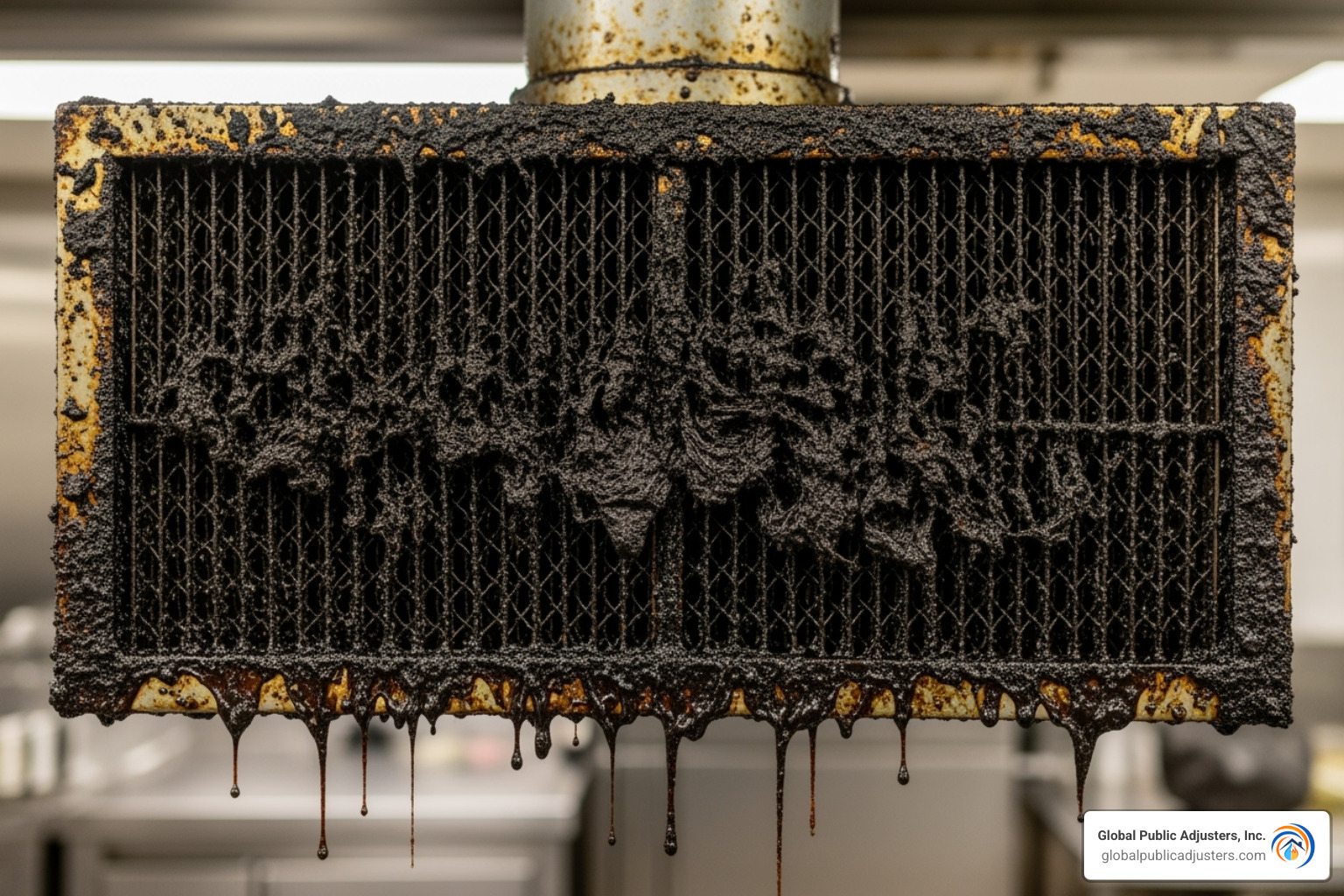
The Role of Cooking Styles and Equipment
Your cooking style significantly impacts fire risk.High-heat cooking, like searing or stir-frying, creates more smoke and vaporized grease, leading to faster buildup in your exhaust system.
Fryingproduces the most grease vapor. If you fry food regularly, your exhaust system requires more frequent cleaning.
Your cooking equipment also plays a role.Gas stoves have an open flame, while commercial charcoal broilers can throw sparks, both of which can ignite grease buildup.
The more you use high heat and oil, the more diligent your cleaning must be.
Mechanical and Electrical Failures
Like any appliance, exhaust fans can fail in ways that create fire hazards.Motor failure is a key danger.Worn bearings can cause a motor to seize, drawing excessive current and heating internal wiring to over 400°F, which can ignite nearby grease, dust, or wood.
Listen for warning soundslike grinding or squealing. These noises indicate wearing bearings and are early warnings of a fire hazard.
Invisibleelectrical problems, like old wiring or corroded connections, can create heat and sparks, providing the ignition source for a grease fire.
The danger of electrical failure is that it can occur even in a system that appears clean, leading to a suddenkitchen exhaust fan fire. These issues are just one of many ways thatfire damage can occur in a home. The key is recognizing the warning signs before they become dangerous.
Proactive Prevention: Your Guide to a Fire-Safe Exhaust System
Preventing akitchen exhaust fan firerequires simple, regular maintenance. The key is toremove the fuel(grease) andeliminate ignition sources(faulty parts). These principles apply to both home and commercial kitchens, though the latter require more frequent attention.
Proactive maintenance protects your family, property, and business. As fire protection experts note, prevention is always smarter than disaster recovery, a critical point detailed inNationwide Fire Protection’s guidefor commercial kitchens.
Essential Cleaning and Maintenance Checklist
Several parts of your exhaust system require regular cleaning to prevent fires.
Filters:Clean home filters monthly (more if you fry often); most are dishwasher-safe. Commercial kitchens require cleaning from daily to every two months, depending on volume.
Fan Blades:Wipe down home fan blades quarterly with a degreaser. Commercial kitchens should include this in their professional service.
Ductwork:This is a hidden danger zone. Homeowners should inspect annually for significant grease and call professionals if needed. Commercial kitchens require regular professionalbare-metal cleaning, with frequency (e.g., quarterly) based on cooking type.
Exterior Hood:Wipe down the hood regularly to remove surface grease and dust.
A “clean” system is free of combustible deposits. The bare-metal finish in commercial systems proves that all fire-feeding grease is gone.
Signs of a Potentially Hazardous Kitchen Exhaust Fan Fire Risk
Your exhaust fan will often show warning signs before a failure. Learn to recognize them.
- Strange Noises:Grinding or squealing often indicates worn bearings, which can lead to motor overheating.
- Burning Smells:A burning odor not from cooking could be an overheating motor or wiring. Investigate immediately.
- Poor Suction:If the fan isn’t clearing smoke well, it’s likely strained, increasing overheating risk and grease buildup.
- Vibrations:Excessive vibration can signal motor problems or loose parts that may cause overheating.
- Grease Dripping:Dripping grease is an immediate fire hazard, indicating significant internal buildup and risk of akitchen exhaust fan fire.
Address these warning signs immediately to prevent a fire.
The Importance of Proper Installation and Sizing
Proper installation is crucial for safety and cannot be fixed by maintenance alone.
Height:The hood must be mounted at the correct height—not too high to be ineffective, not too low to be a hazard. Commercial kitchens require at least 18 inches of clearance (more for some equipment).
Duct Material:Use only solid metal ducts (steel or stainless steel). Flammable plastic or foil ducts are a major fire hazard.
Duct Bends:Minimize bends in the ductwork. Each 90-degree turn restricts airflow, strains the motor, and increases grease buildup.
Termination:The exhaust must terminate outside—never in an attic or crawlspace, which creates a hidden fire risk.
Sizing:An undersized fan won’t remove grease and smoke effectively, leading to buildup. A properly sized fan is essential for safety.
Correct installation from the start is the best way to reduce your risk of akitchen exhaust fan fire.
Residential vs. Commercial Systems: Understanding Key Differences
Preventing akitchen exhaust fan firerequires understanding the key differences between residential and commercial systems. Though the fire risks are similar, the scale and regulations are vastly different. A home kitchen produces moderate grease, while a commercial kitchen is a high-volume grease factory, multiplying the fire risk.
Here’s how these systems compare across key safety factors:
| Feature | Residential Kitchen Exhaust System | Commercial Kitchen Exhaust System |
|---|---|---|
| Materials | Basic galvanized steel or aluminum | Heavy-duty stainless steel, welded seams |
| Fire Codes | Basic local building codes | Strict NFPA 96 compliance required |
| Cleaning Frequency | Monthly filter cleaning, annual inspection | Daily to monthly cleaning, quarterly professional service |
| Fire Suppression | Optional, usually just fire extinguisher | Mandatory automatic suppression systems |
| Ductwork Access | Limited access for cleaning | Required access panels every 12 feet |
| Grease Production | Low to moderate | High volume, continuous |
| Liability Exposure | Personal property loss | Business closure, liability claims |
| Professional Services | Optional for deep cleaning | Required by law and insurance |
The stakes are higher commercially. Akitchen exhaust fan firein a restaurant can shut down the business, endanger staff, and lead to major liability claims.
Commercial Kitchens: Regulations and Best Practices
Commercial kitchens face strict regulations due to extreme fire risks from high-volume grease production. TheNational Fire Protection Association‘sNFPA 96standard is the legal and insurance requirement in most areas for commercial cooking operations.
Automatic fire suppression systemsare mandatory. ModernUL 300 standardsystems use wet chemicals that turn burning grease into soap (saponification) while cooling the fuel, a major improvement over older dry chemical systems.
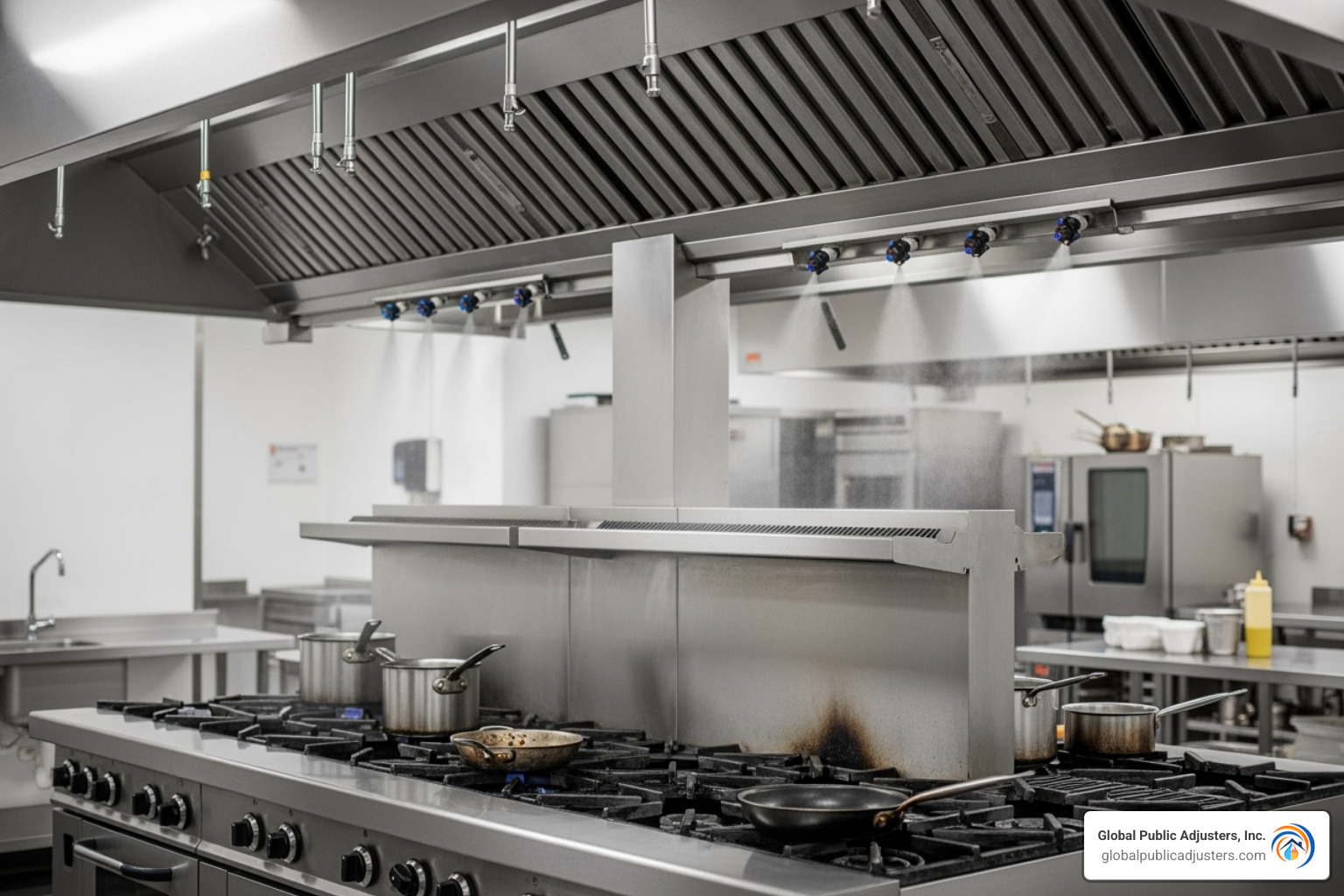
Access panelsare also required. These grease-tight panels must be installed at regular intervals in ductwork to allow for the thorough cleaning necessary to prevent fires.
Rooftop grease containmentis needed to collect grease that escapes the fan, preventing roof damage and fire hazards.
Finally,bare-metal cleaningis required, meaning every accessible surface inside the system must be professionally cleaned of all combustible grease.
Residential Kitchens: Simple Steps for Home Safety
For homeowners, preventing akitchen exhaust fan fireis simpler and relies on consistent habits.
Know your hood type.Ducted hoodsvent grease and smoke outside and are generally safer.Ductless hoodsrecirculate air and require more diligent filter cleaning, as they only trap grease instead of removing it.
Clean filters monthly.This is your most important task. Most filters are dishwasher-safe. Clean more often if you frequently fry food.
Inspect annually.Use a flashlight to check the fan and accessible ductwork. If you see significant grease buildup, call a professional.
Avoid unattended use.While a clean fan is safe to run, a dirty fan left running unattended creates an unnecessary fire risk.
In short, residential safety relies on personal vigilance, while commercial systems use built-in redundancies and professional oversight. The margin for error is much smaller in commercial kitchens.
In Case of Emergency: What to Do During and After an Exhaust Fire
Even with proper maintenance, akitchen exhaust fan firecan happen. Your response in the first few minutes is critical to minimizing damage. Stay calm and act quickly.
After the fire, you face the challenge of recovery and insurance claims. For guidance on this process, readThe Best Way to Deal with an Insurance Adjuster After a House Fire.
Immediate Steps to Take if a Kitchen Exhaust Fan Fire Occurs
If you see flames in your exhaust system, act immediately:
Evacuate everyone.Get everyone out of the building immediately. Lives are more important than property.
Turn off the heat and the fan.If safe, turn off the stove. Crucially, turn off the exhaust fan to stop it from feeding flames into the ductwork.
Smother small flames.For a small, contained grease fire, use a metal lid or fire blanket.Never use water, as it will splatter the burning grease and spread the fire.
Use the right fire extinguisher.Use a Class K (commercial) or Class B/ABC (home) extinguisher only if the fire is small and you are trained. If in doubt, get out.
Call 911.If the fire is growing or has entered the ductwork, evacuate immediately, close doors behind you to contain the fire, and call 911.
After the Fire: Navigating Damage and Insurance Claims
After the fire is out, you’ll find that akitchen exhaust fan fireoften causes widespread damage. Beyond the visible flames, smoke and soot can affect your entire property.
Document all damage.Take photos and videos of everything affected, including structural issues and personal belongings. Keep all reports and receipts.
Address smoke and soot.Corrosive smoke particles permeate walls and furniture, causing ongoing damage that requires professional cleaning.
Check structural integrity.Heat from a fire in the ductwork can compromise your home’s structure. A professional inspection is necessary to ensure safety.
Navigating the insurance claim process is complex. Your insurance company’s adjuster works to minimize their payout, not to help you. This is where we come in.
At Global Public Adjusters, Inc., we represent you, the policyholder. With over 50 years of experience, we fight for the maximum settlement you deserve, handling the paperwork and negotiations so you can focus on recovery. Learn more aboutWhy Hire a Public Adjuster for Fire Damage.
Fire restorationrequires specialists who can handle smoke removal and rebuilding to code. If you’re in our area, we can connect you with trustedFire Restoration Services in Orlando.
You don’t have to face the overwhelming aftermath of a fire alone.
Frequently Asked Questions about Exhaust Fan Fires
Here are answers to common questions aboutkitchen exhaust fan firerisks.
Do exhaust fans need to shut down during a fire alarm?
The answer depends on local building codes and the system’s design. In many commercial kitchens, the fan continues to run during an alarm to evacuate smoke and heat, aiding escape and firefighting efforts. Conversely, some codes require fans to shut off to prevent spreading fire and smoke through ductwork not rated for fire containment.
The integration offire alarmsystems and ventilation is highly regulated. Always consult your local fire department or building inspector to ensure compliance with local codes.
Can leaving a kitchen exhaust fan on cause a fire?
It’s unlikely if the fan is clean and well-maintained, as motors are designed for continuous use. The risk increases dramatically with poor maintenance because grease buildup provides flammable fuel.
An overheating motor from worn parts or electrical faults can easily ignite this grease. Therefore, leaving aneglectedfan running, especially unattended, significantly increases yourkitchen exhaust fan firerisk. The bottom line: A clean fan is safe to run for extended periods. A dirty one is not.
How do bathroom exhaust fan fire risks compare to kitchen fans?
Bathroom exhaust fans can also cause fires, but the risks differ from kitchen fans.
The fuel is different.Kitchen fans accumulate highly combustible grease. Bathroom fans accumulate flammable lint and dust, which is less volatile than grease.
The ignition is similar.In both, an overheating motor caused by worn bearings or electrical faults can ignite the accumulated debris (grease or lint).
Kitchen fires are often more severe.Grease fires burn hotter and spread faster than lint fires.
As noted in reports likeFire officials: Bathroom exhaust fans can cause fires, any appliance with a motor and potential for combustible buildup requires regular maintenance. Kitchen fans need frequent degreasing, while bathroom fans need regular dusting and blockage checks. Both types of fans require regular maintenance to prevent fire risk.
Conclusion
The reality ofkitchen exhaust fan firesis that they are common but preventable. As we’ve shown, this hidden danger stems from simple neglect, like a dirty filter or grease buildup.
Vigilance is your best defense. The primary risk factors—grease buildup, electrical faults, and poor maintenance—are all within your control.
For both home and commercial kitchens, the principle is the same: regular cleaning is essential. Clean filters monthly, inspect ductwork annually, and pay attention to warning signs like strange noises or poor performance. For commercial operators, NFPA code compliance protects your business and people. Professional cleaning and proper fire suppression are crucial investments.
The cost of neglect can be devastating, leading to property loss, displacement, and business closures. We’ve seen this firsthand, but we’ve also helped clients steer the complex insurance process.
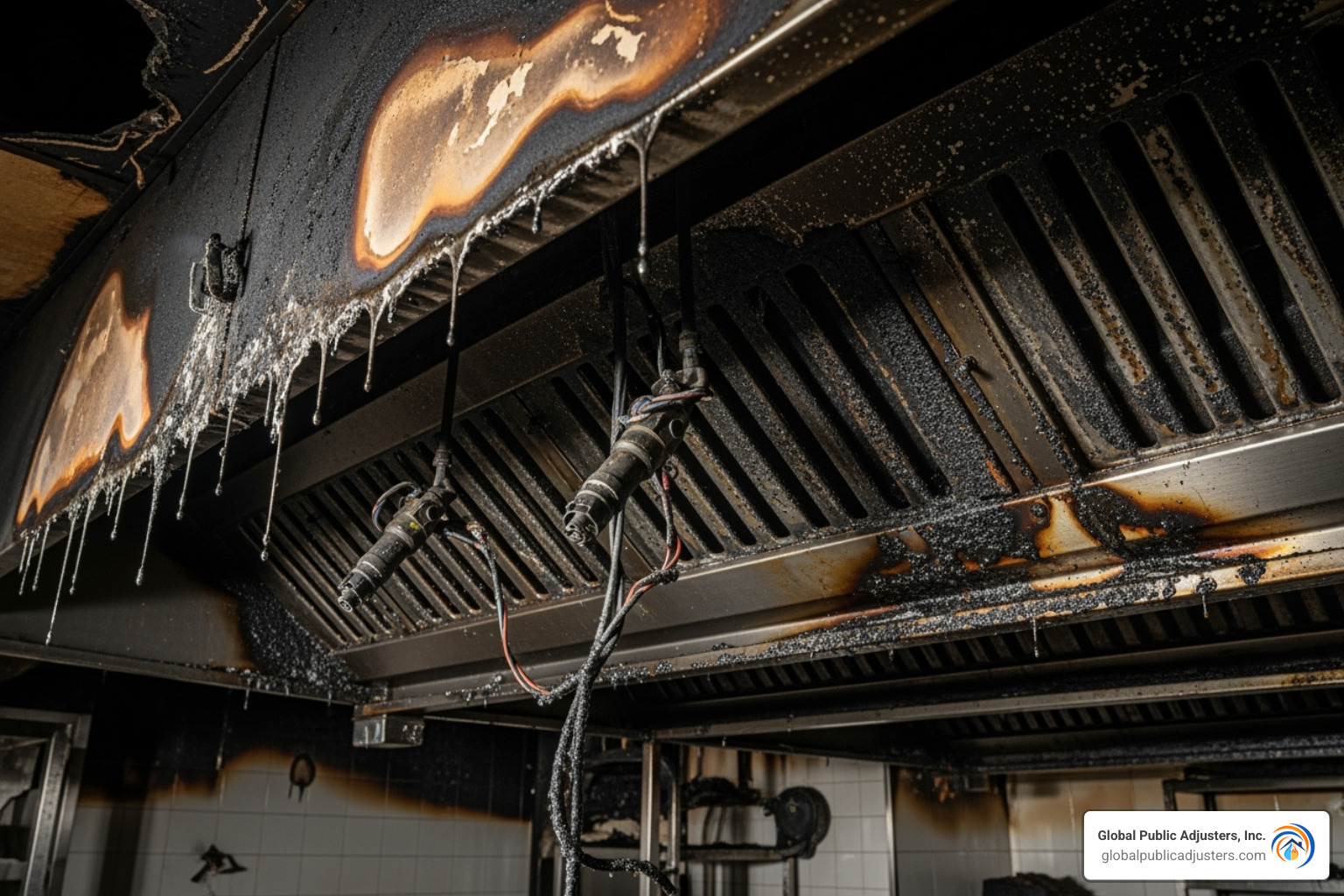
If you’ve experienced akitchen exhaust fan fire, you’re not alone. For over 50 years, Global Public Adjusters, Inc. has helped Florida homeowners and businesses steer complex insurance claims. We work to restore not just your property, but your peace of mind.
Our team specializes in maximizing fire damage settlements. We handle the negotiations and paperwork so you can focus on recovery.
If you’ve experienced a kitchen fire, navigating the insurance process can be overwhelming. Get expert help with your Orlando kitchen damage claims.Let us turn this challenging chapter into a story of successful recovery and renewed peace of mind.

